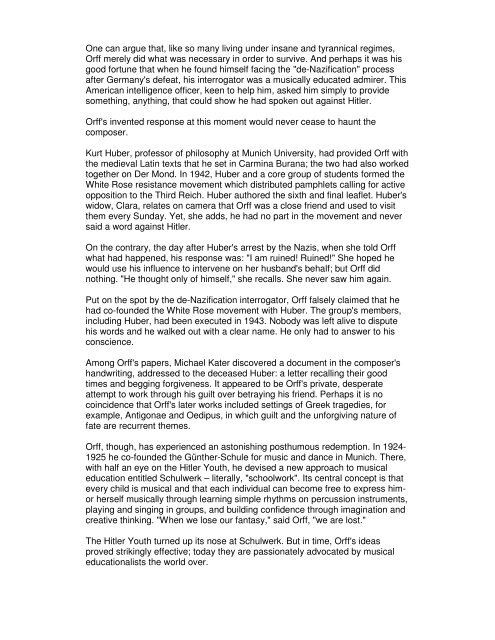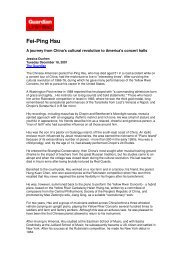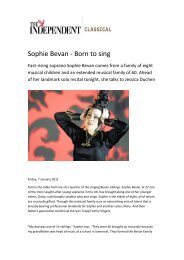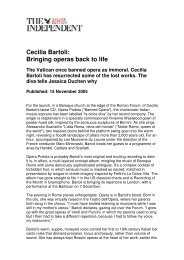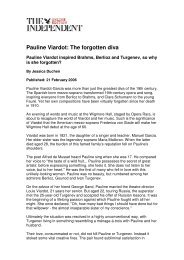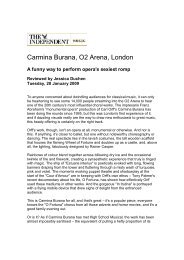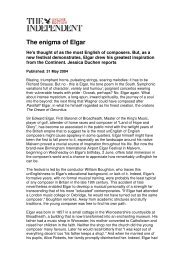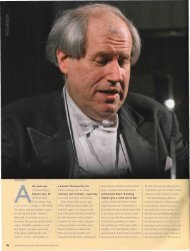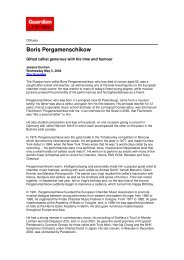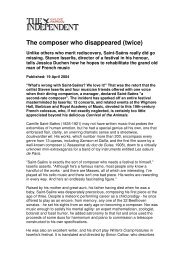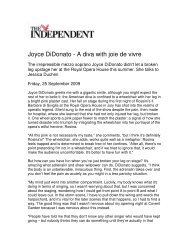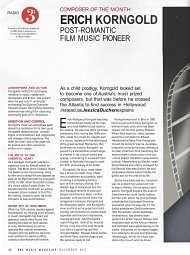Dark heart of a masterpiece: Carmina Burana's ... - Jessica Duchen
Dark heart of a masterpiece: Carmina Burana's ... - Jessica Duchen
Dark heart of a masterpiece: Carmina Burana's ... - Jessica Duchen
You also want an ePaper? Increase the reach of your titles
YUMPU automatically turns print PDFs into web optimized ePapers that Google loves.
One can argue that, like so many living under insane and tyrannical regimes,<br />
Orff merely did what was necessary in order to survive. And perhaps it was his<br />
good fortune that when he found himself facing the "de-Nazification" process<br />
after Germany's defeat, his interrogator was a musically educated admirer. This<br />
American intelligence <strong>of</strong>ficer, keen to help him, asked him simply to provide<br />
something, anything, that could show he had spoken out against Hitler.<br />
Orff's invented response at this moment would never cease to haunt the<br />
composer.<br />
Kurt Huber, pr<strong>of</strong>essor <strong>of</strong> philosophy at Munich University, had provided Orff with<br />
the medieval Latin texts that he set in <strong>Carmina</strong> Burana; the two had also worked<br />
together on Der Mond. In 1942, Huber and a core group <strong>of</strong> students formed the<br />
White Rose resistance movement which distributed pamphlets calling for active<br />
opposition to the Third Reich. Huber authored the sixth and final leaflet. Huber's<br />
widow, Clara, relates on camera that Orff was a close friend and used to visit<br />
them every Sunday. Yet, she adds, he had no part in the movement and never<br />
said a word against Hitler.<br />
On the contrary, the day after Huber's arrest by the Nazis, when she told Orff<br />
what had happened, his response was: "I am ruined! Ruined!" She hoped he<br />
would use his influence to intervene on her husband's behalf; but Orff did<br />
nothing. "He thought only <strong>of</strong> himself," she recalls. She never saw him again.<br />
Put on the spot by the de-Nazification interrogator, Orff falsely claimed that he<br />
had co-founded the White Rose movement with Huber. The group's members,<br />
including Huber, had been executed in 1943. Nobody was left alive to dispute<br />
his words and he walked out with a clear name. He only had to answer to his<br />
conscience.<br />
Among Orff's papers, Michael Kater discovered a document in the composer's<br />
handwriting, addressed to the deceased Huber: a letter recalling their good<br />
times and begging forgiveness. It appeared to be Orff's private, desperate<br />
attempt to work through his guilt over betraying his friend. Perhaps it is no<br />
coincidence that Orff's later works included settings <strong>of</strong> Greek tragedies, for<br />
example, Antigonae and Oedipus, in which guilt and the unforgiving nature <strong>of</strong><br />
fate are recurrent themes.<br />
Orff, though, has experienced an astonishing posthumous redemption. In 1924-<br />
1925 he co-founded the Günther-Schule for music and dance in Munich. There,<br />
with half an eye on the Hitler Youth, he devised a new approach to musical<br />
education entitled Schulwerk – literally, "schoolwork". Its central concept is that<br />
every child is musical and that each individual can become free to express himor<br />
herself musically through learning simple rhythms on percussion instruments,<br />
playing and singing in groups, and building confidence through imagination and<br />
creative thinking. "When we lose our fantasy," said Orff, "we are lost."<br />
The Hitler Youth turned up its nose at Schulwerk. But in time, Orff's ideas<br />
proved strikingly effective; today they are passionately advocated by musical<br />
educationalists the world over.


